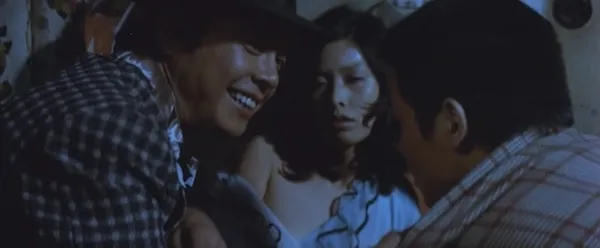Eye For Film >> Movies >> Last Days Of The Boss (1976) Film Review
Last Days Of The Boss
Reviewed by: Jennie Kermode

The final part of Kinji Fukasaku's New Battles Without Honor And Humanity, Last Days Of The Boss brings a tighter, more personal focus to the ongoing sagas of gangland conflict. Bunta Suguwara is back, this time as Shuichi Nozaki, a lowly labourer taken on by a powerful yakuza boss. When that boss is killed, he yearns for revenge, but gangs right along the west coasts of Japan are in the process of signing an accord that forbids the assassination of leaders. Nozoki is forced to scheme in secret, but as he does so, his situation is complicated further by the unexpected arrival of his sister Asami (Chieko Matsubara), with rumours quickly spreading that the two are closer than siblings ought to be.
This is easily the most polished of the three films, combining and improving on the strongest action elements of the first two and demonstrating far more narrative coherence. Although its original script was as rambling as the others, it has been stripped down to something better suited to the medium, yet the characters have retained the depth granted to them by all that extra work. Matsubara is particularly impressive, bringing a brittleness to her performance that highlights the psychological effect of a lifestyle we have hitherto been encouraged to take for granted. Her work calls attention to the boorishness of many of the male characters, inviting viewers to ask if it is, at root, a kind of deliberate self-distraction from the danger that is everywhere here.
Like the other two films in the series, this film draws inspiration from real life gangster stories - in this case, some of them are very recent. It also draws on a real murder case, with a police investigation into the death of a young woman running parallel to the main narrative until, inevitably, we discover their connection. This mystery helps a lot with Fukasaku's sometimes wayward pacing. Though it's a routine plot device today, it was rare in Japan at the time. For once, this film lets us see the suffering of female characters having an emotional impact on men; and, this, too, challenges the idea of the yakuza as removed from such concerns.
The flair that Fukasaku would demonstrate in some of his later films comes through strongly here. Intense indoor scenes in low lighting are contrasted with outdoor action scenes under a wide grey sky which creates an immediate sense of exposure and vulnerability. Even in these, the camera stays close to the protagonists, increasing the sense that danger could come out of nowhere.
In yakuza films prior to this, bosses simply didn't die. conflict belonged to the lower orders. Last Days Of The Boss breaks the rules and signals a change of culture in the the real and fictional worlds alike.
Reviewed on: 23 Aug 2017

















